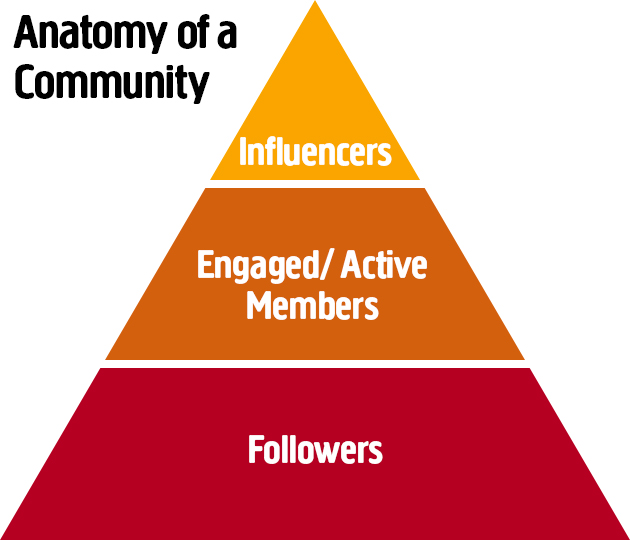Craig Charley
21 Jan 2014
Why Communities are Essential to Growing your Startup
Communities are your best social media tool when starting a business.
Stop shouting into a void and start communicating; they are a great way to engage with potential customers, investors and brand advocates.
Offline networking is still a powerful tool but online communities can give you a global reach and are often more time and cost effective for your limited resources.
In this post you'll find out why communities are so vital and how you can start using them.

To learn more about using social media & communities to grow your business and engage with consumers and influencers, come on our Social Media workshops and Blogging courses. Together they will give you a powerful toolset to boost your brand online.
Why It's Important
You've started new business with a new idea. How do you get people to care?
You could spend money on advertising, but it would have to be a very good campaign to convince prospective buyers to take interest in a company they've never heard of.
Social proof is a strong selling point; it's not surprising why social media platforms are trying to take advantage of it with social ads (your friend X like our product) and why consumers are so protective of how their actions are used as social proof.
Recommendations are most valuable when they come naturally. It's easy to tell the difference between a genuine review and one prompted by a promotion or giveaway.
If you can create a community around your business or convince an existing community to take notice of your business then they will do a lot of the hard work for you, giving you the initial investment that you can later use on advertising to grow outside of the community.
Anatomy of a Community
A community can take many forms - a forum, social media group and even crossplatform communities. Yet most communities share the same anatomy.
At the heart of every community are the influencers; usually a few, sometimes only one person.
The influencers drive the community and shape the discussions and interaction within it.
Below them you have the more engaged members. They may not have as much influence but they are the most active members of the community and themselves influence the influencers. If a large number of engaged members are heading in a direction it is hard for the influencer to stop it even if they have opposing views.
Finally you have the followers. They are less active and less opinionated that the engaged members and are generally happy to go along with the community. If the community is heading in a direction they don't like they are more likely to leave than try and influence discussion.

To apply this model to a real situation, think of a product support forum:
At the top you have the employees; they are the most knowledgeable and provide the 'official' answers.
Below you have the most active contributors. They will try to solve common problems and will engage with others on how the product can be improved.
At the bottom the followers are the ones asking for help, either by asking a question or finding an answer in a previous discussion.
If you are looking to join a community you should be aiming to enter as an engaged member, with the opportunity to rise to influencer in the future. Unless you've already built yourself up as an authoritative figure then it is very hard to join a community as an influencer.
If you are starting your own community then by default you begin as an influencer. This is the 'community manger' role than many companies are starting to invest in.
Startup Communities
There are three ways you can use communities to boost your business. You can join startup communities to get advice from likeminded entrepreneurs; niche communities to engage with consumers and influencers in your market; and you can also start your own community.
Startup communities are a place for entrepreneurs and new business owners to support each other and share experiences and advice.
Usually they are started by successful entrepreneurs and ex-startup owners who want to help others follow their lead.
Advice can range from the best ways to source funding to ideas for growth as well as solutions for any problems you may encounter.
If you're new to running your own business then joining a startup community is an essential step towards success and can help you find a mentor.
There are some excellent startup communities on LinkedIn and Google+ with regular discussion and experts on hand to help answer any questions.
Niche Communities
Actively participating in industry communities is essential for businesses of all sizes but is most important to smaller businesses that don't have the marketing bucks and so have to rely more on word of mouth early on.
This is your chance to make a name for yourself in your sector and connect directly with consumers.
Many businesses use these communities to test products and services prior to launch. It's a great way to get feedback from the most engaged consumers who (if it's good enough) will then evangelise your business when you launch.
Niche communities take place on different platforms depending on the industry but forums are a good place to start looking.
Building your own Community
Joining existing communities is a good start but the eventual aim is to build your own.
A good place to start with building your own community is with Brad Feld's book 'Startup Communities: Building an Entrepreneurial Ecosystem in Your City' or you get can started with his accompanying blog Startup Revolution.

Starting your own community has advantages over joining an existing community because you direct the conversation. You create a tribe around your product which will support and promote your business throughout its development.
There are plenty of ways to build a community that depend on how much time you have to give.
Create a Google+ community, weekly hangout or Twitter chat, add a forum to your website or start a blog that encourages sharing and engagement.
Look at Moz.com - they have mozinars (webinars), Q&As (answers provided by members of the community, not just Moz employees), events, a blog that attracts 50-100 comments per post and even a user-generated blog. They even have a webinar to help you increase activity in your online community!
So much of the above is User Generated Content (UGC), Moz just have to moderate it and keep the community running.
The webinar I linked to was created by Richard Millington, FeverBee founder based in London; a perfect example of both a business owner using an existing community and a brand's successful community in action.
If you can create such a passionate community around your brand then a lot of the hard work is done for you.
Influencers & Brand Advocates
The most powerful members of any community are the influencers. As described in the 'anatomy of a community' the influencers drive the discussion and opinion of their communities.
They're the ones sharing the hottest content and you want them to be talking about you.
We learnt a lot about this from Stephen Pavlovich's talk at the Content Marketing Show 2012. Tweets from Stephen Fry and Simon Powell crashed wish.co.uk's website due to high traffic and led to further tweets from Jamie Oliver and Derren Brown and mentions in national newspapers and popular magazines. (find out more in our Content Marketing strategy eBook)
This sort of coverage is so much easier with influencers sharing your product or story, so it's important to have something shareable.
You might not want to target celebrities, but at least find out who the biggest influencers are in your niche and get them on your site. Talk to them through mutual communities and start a relationship; they will become an essential source of promotion in the future.
Funding
The most useful (and important to your success!) reason for using communities as a startup is to raise funds, and there are few better ways to do it.
Firstly, you can use those networks, communities and brand advocates you've developed to help spread the word. The most successful campaigns are those taken up by celebrities or strong communities online.
The truly social way to raise funds online is through crowdfunding platforms like Indiegogo and Kickstarter.
In 2013, 3 million people backed a project on Kickstarter from all over the world.
The premise is simple. In return for funding your project/idea/business, you offer to give backers special rewards based on their investment. This can range from a thanks for a pound, up to early product launches and incredible one-off opportunities like appearing on a film's credits, in a book's thank you section or an exclusive meeting with somebody on the project.
This creates a community around your business and encourages your fans to share your idea.
So not only do you get funding for your idea but you build a strong community ready to help you out when you launch.
It's hard to rely on crowdfunding alone, so I recommend first building up a following on other social channels which you can use to get your project off the ground.
Still not convinced?

